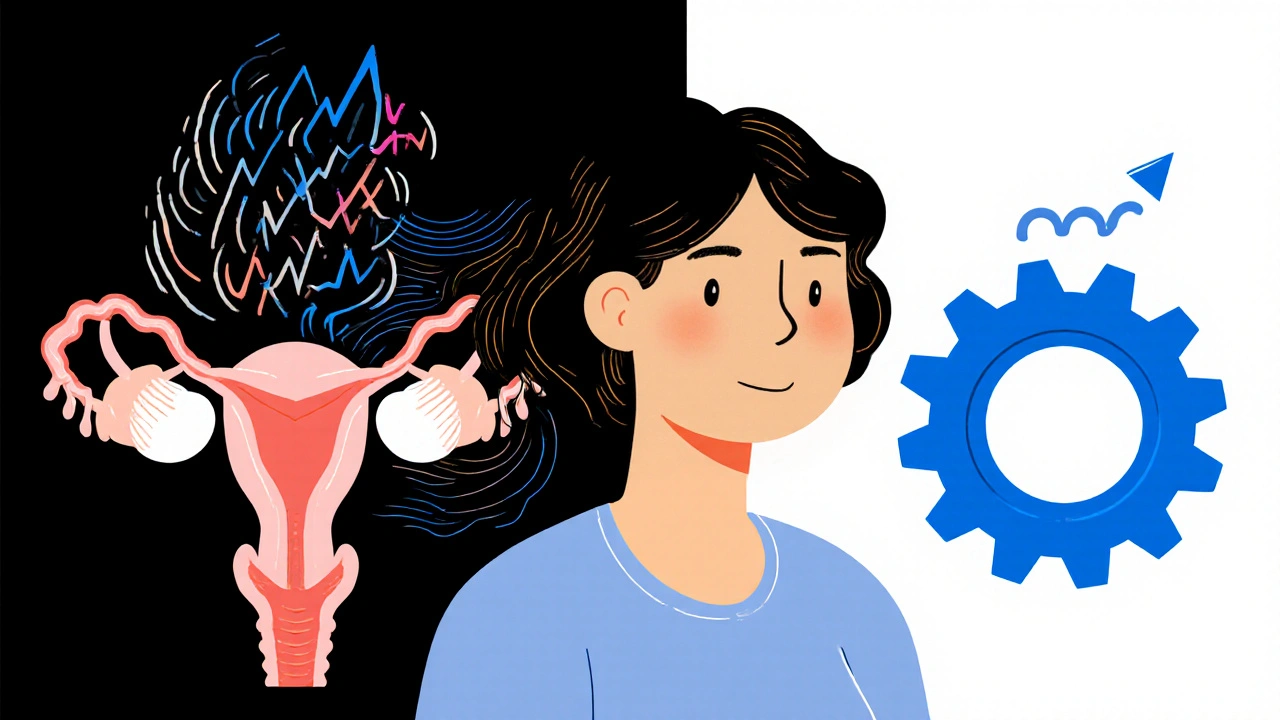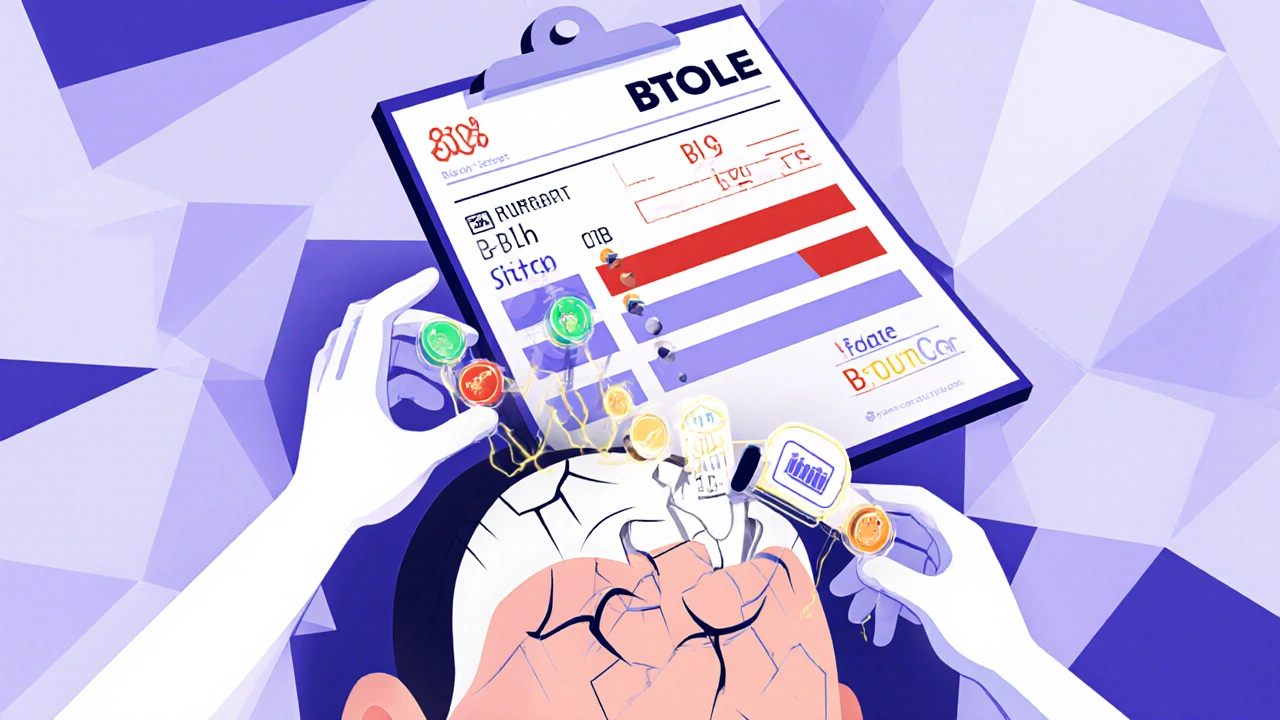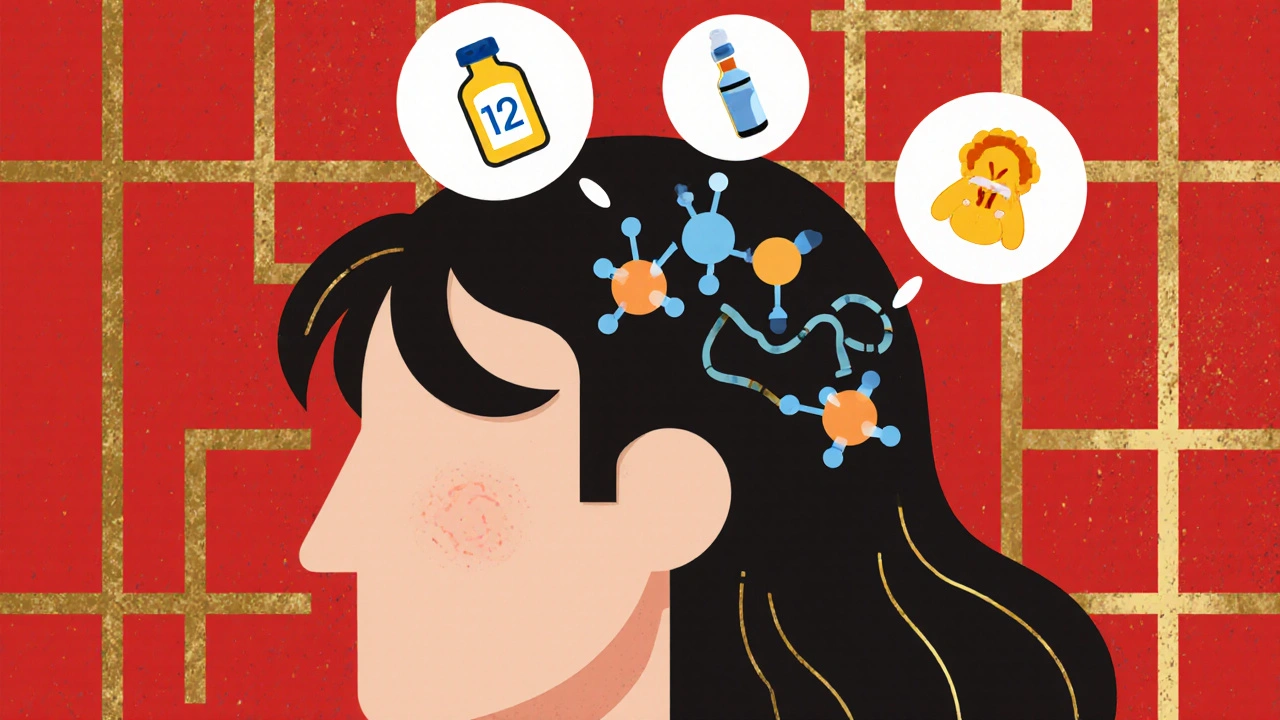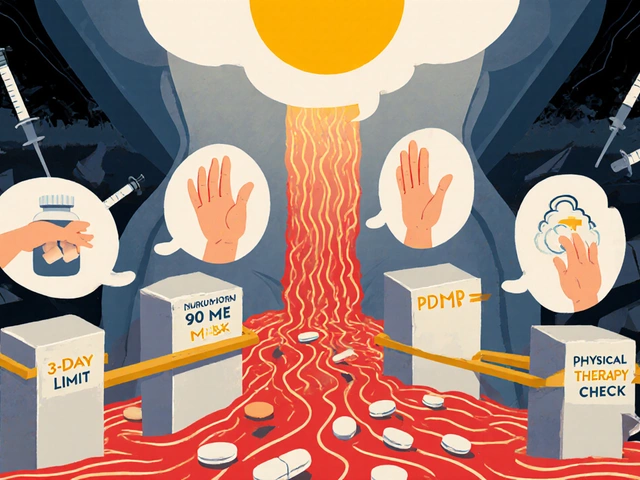If you’re taking metformin and noticing more hair in your brush or shower drain, you’re not alone. Many people wonder: is this drug causing my hair to thin? The short answer? It’s unlikely metformin is directly responsible-but it might be linked through other health factors you’re also managing.
What Metformin Actually Does
Metformin is one of the most prescribed medications in the world, especially for type 2 diabetes. It works by lowering blood sugar in two main ways: reducing how much glucose your liver releases and helping your body use insulin more effectively. It’s also commonly used off-label for polycystic ovary syndrome (PCOS), where insulin resistance plays a big role.
Unlike many diabetes drugs that cause weight gain, metformin often leads to modest weight loss or stability. That’s why it’s popular for people with PCOS, prediabetes, or metabolic syndrome-even if they don’t have full-blown diabetes.
Common side effects include stomach upset, bloating, gas, and occasional diarrhea. These usually fade after a few weeks. But hair loss? That’s not listed in the official prescribing information.
Why People Think Metformin Causes Hair Loss
The confusion comes from timing. People often start metformin when they’re already dealing with hormonal imbalances-especially women with PCOS. And hair loss is a well-known symptom of PCOS.
Insulin resistance, which metformin treats, is strongly tied to higher levels of androgens like testosterone. These hormones shrink hair follicles, leading to thinning on the scalp. So when someone starts metformin and sees hair shedding a few months later, it’s easy to blame the drug. But the real culprit might be the underlying condition, not the treatment.
Some studies show that metformin can actually help reduce hair loss in women with PCOS by improving insulin sensitivity and lowering androgen levels. A 2019 study in the Journal of Clinical and Aesthetic Dermatology found that women with PCOS who took metformin for six months saw a significant reduction in hair shedding and improved scalp coverage.
Could Metformin Cause Hair Loss Indirectly?
Yes-but not because it attacks hair follicles. It’s more about nutrient depletion.
Long-term use of metformin is linked to lower levels of vitamin B12. This isn’t a rare side effect: up to 30% of people on metformin for more than four years develop a deficiency. Vitamin B12 is essential for red blood cell production and healthy hair growth. Low levels can lead to hair thinning, fatigue, and even neurological symptoms.
Metformin also interferes with the absorption of folic acid (vitamin B9) and iron in some people. These nutrients are critical for cell division and oxygen delivery to hair follicles. If you’re low on any of them, your hair cycle can shift into a resting phase, causing more strands to fall out than usual.
That’s why doctors often recommend regular blood tests for people on long-term metformin. Checking B12, ferritin (iron stores), and folate levels isn’t just routine-it’s preventive.

Other Causes of Hair Loss You Can’t Ignore
If you’re on metformin and losing hair, don’t jump to conclusions. Many other factors are far more likely to blame:
- Stress-physical or emotional-can trigger telogen effluvium, where hair enters shedding mode all at once. This often happens after illness, surgery, or major life changes.
- Thyroid problems-both underactive and overactive thyroid can cause diffuse hair loss. This is common in women with PCOS or autoimmune conditions.
- Genetics-female pattern hair loss (androgenetic alopecia) is hereditary and worsens with age.
- Crash diets or low protein intake-your hair needs protein to grow. If you’re eating too little or cutting carbs too aggressively, your body may shut down non-essential functions like hair growth.
- Medications-blood pressure drugs, antidepressants, birth control pills, and even high-dose vitamin A can cause hair shedding.
Metformin is rarely on that list. But if you’re taking it for PCOS, you might also be on birth control or spironolactone-which can affect hair too.
What to Do If You’re Losing Hair on Metformin
Don’t stop taking metformin without talking to your doctor. It’s a safe, well-studied drug-and stopping it could worsen your blood sugar or PCOS symptoms.
Instead, take these steps:
- Get blood work done. Ask for serum B12, ferritin, folate, thyroid panel (TSH, free T3, free T4), and testosterone levels if you have signs of PCOS.
- Check your diet. Are you eating enough protein? Aim for 0.8-1.2 grams per pound of body weight. Include iron-rich foods like lean red meat, lentils, spinach, and fortified cereals.
- Consider supplements. If your levels are low, your doctor may recommend B12 injections or sublingual tablets, iron supplements (only if deficient), and a high-quality multivitamin with biotin and zinc.
- Look at your hair care routine. Avoid tight ponytails, excessive heat styling, and harsh chemical treatments. Use gentle shampoos and avoid daily washing if your scalp feels dry.
- Track the pattern. Is the hair loss patchy? Or is it thinning evenly across the scalp? Patchy loss could signal alopecia areata-an autoimmune condition. Even distribution suggests telogen effluvium or hormonal causes.

When to See a Dermatologist
If your hair loss continues for more than three months, or if you’re losing more than 100 strands a day (you can test this by not washing your hair for 2-3 days and gently pulling a small section-you should lose fewer than 5-10 hairs), it’s time to see a dermatologist who specializes in hair disorders.
They can do a scalp biopsy, trichogram, or use a dermoscope to examine your follicles. They’ll also check for signs of scarring, inflammation, or fungal infection.
Many cases of hair loss are reversible once the trigger is identified and corrected. In fact, most people see regrowth within 6-12 months after fixing nutrient gaps or stabilizing hormones.
Bottom Line: Metformin Isn’t the Villain
Metformin doesn’t directly cause hair loss. But it can reveal or worsen underlying issues-like B12 deficiency, insulin resistance, or hormonal imbalance-that do.
Think of metformin as a mirror. It doesn’t create the problem, but it can make you notice it. If you’re losing hair while on this medication, the solution isn’t quitting the drug. It’s looking deeper: at your nutrition, your hormones, and your overall health.
With the right testing and adjustments, you can fix the root cause-and keep both your blood sugar and your hair healthy.
Can metformin cause hair loss directly?
No, metformin does not directly cause hair loss. It is not listed as a side effect in clinical trials or prescribing guidelines. Hair loss in people taking metformin is usually due to underlying conditions like PCOS, nutrient deficiencies (especially B12), or hormonal imbalances that metformin is meant to treat.
Does metformin help with hair loss in PCOS?
Yes, for many women with PCOS, metformin can improve hair loss over time. By reducing insulin resistance, it lowers androgen levels like testosterone, which are responsible for scalp hair thinning. Studies show improved hair density after 6 months of consistent use.
How long does it take for hair to grow back after stopping metformin?
You shouldn’t stop metformin unless advised by your doctor. If hair loss is due to a B12 deficiency caused by metformin, correcting the deficiency with supplements can lead to regrowth in 3-6 months. Hair grows slowly-about half an inch per month-so patience is key.
What blood tests should I ask for if I’m losing hair on metformin?
Ask for serum B12, ferritin (iron stores), folate, thyroid function (TSH, free T3, free T4), and if you have signs of PCOS, total and free testosterone and DHEA-S. These tests help identify the real cause behind the hair loss.
Is hair loss from metformin permanent?
No. Hair loss linked to metformin is almost always temporary and reversible. Whether it’s due to nutrient deficiency, hormonal changes, or stress, fixing the underlying issue typically leads to regrowth within several months. Permanent hair loss from metformin alone has never been documented.






I started metformin last year for prediabetes and noticed my hair thinning a bit. At first I freaked out, but after reading this I realized it’s probably the B12 deficiency. Got my levels checked and they were low as hell. Started taking sublingual B12 and the shedding stopped within two months. Not saying it’s magic, but it’s definitely not the drug itself.
October 29Robert Bowser